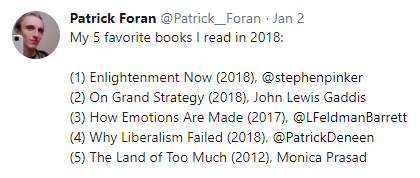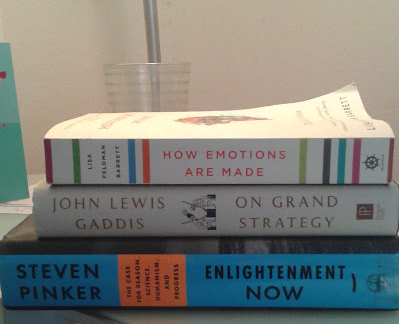I tweeted out my favorite books of 2018, and I wanted to blog a bit about my selections.

(5) Monica Prasad’s The Land of Too Much: American Abundance and the Paradox of Poverty is what I categorize as an “ideal type.” This book was assigned in a graduate seminar in American Politics and Political Economy. My professor encouraged us to use her first few chapters as a template for any literature reviews we might write. I completely agree. Prasad proves that she has a firm grasp of the alternative arguments that she adds to, takes away from, or directly challenges. This book is one of the most learned, nuanced, and counterintuitive books that I have read on the topic of welfare states, inequality, and historical institutionalism alike.
Prasad brilliantly details that early decisions and putative progressive successes in the late 19th century set American on a path that, paradoxically, entrenched progressive income taxes, and cheap credit which has produced more, not less, inequality. America has a welfare state, like all other advanced welfare states, but it is one that encourages private consumption for goods that are normally more socialized. The reason for the “paradox of poverty” that is seen in the subtitle refers to the fact that this type of welfare state was pushed for by agrarians in the 19th century: progressive successes have produced a welfare state that hurts those worse off and one that benefits the middle class. I won’t do this book justice in this blog post: here is a great piece from the author herself that succinctly displays her thesis, which is that America has plenty of government, it has a welfare state; the problem, if you want a more egalitarian society, is the type of welfare state and what function and outcomes it achieves. Read Prasad on political economy and comparative analysis and you will be rewarded.
(4) Patrick J. Deneen’s Why Liberalism Failed is an immediate classic, in my opinion. A real piece of political philosophy that, due to Deneen’s environs, milieu, and academic home (University of Notre Dame, a private Catholic institution), might challenge its most likely reader because Deneen (similar to Benjamin Barber’s Jihad vs McWorld) argues that both the state and the market have disrupted the traditional lifestyles that conservatives tend to champion. Deneen does a fantastic job of explaining that liberalism, the classic-type (free markets, hyper-individualism) is failing American families because it is succeeding. Liberalism, the left and right varieties, has become the only game in town – which, in his estimation, has largely contributed to what is commonly referred to as our current “crisis of meaning.”
Deneen’s prescriptions – localism, tradition, religion – are the most contentious part: if liberalism is better than fascism and communism, can we guarantee that a post-liberal age that would be more rooted in tradition, small, and local communities, be preferred? I agree with the likes of Tyler Cowen and Ezra Klein that this book is a must read, even if you disagree with the ultimate thesis that liberalism is failing. Personally, I think we need a new “embedded liberalism,” that understands that family, tradition, and local-connections that foster human capital is the way to assure that liberalism can be maintained and strengthened.
(3) In How Emotions Are Made: The Secret Life of the Brain, Northeastern University’s Lisa Feldman Barrett produces cutting-edge synthesis on a field that she is a heavyweight in: the science of emotions. A fascinating, and brilliant read. Malcolm Gladwell remarked that this book “turned [his] understanding upside down.” For me, this book actually aligns with much of what I have come to believe about emotions: they are socially constructed, not determined by the array of neurochemistry produced by an individual emotion, and that we have much control regarding our experience. “When it comes to your experiences and perceptions, you are much more in the driver’s seat than you might think. You are an architect of your experience,” writes Barrett (152).
Barret is not saying, of course, that emotions don’t have a biological foundation; she is saying that we need to understand that “physical states and actions” (X), combine with “the emotion categories that exist in a particular culture” (Y), and “the contents and the workings of the categories as situated conceptualizations that constitute emotions in a particular culture” (C). Barrett backs up her claims with a rigorous review of the data from psychology accumulated over the last few decades. Her work, if true (which I am convinced of), should (in a just world) revolutionize how we think of mental health (she is a fan of mindfulness), criminal justice law, interpersonal relationships, and, yes, how we think of our emotions and the meaning we attribute to the physiological reality of them. There is even a provocative–some science, some speculation–chapter called “Is a Growling Dog Angry?” about whether animals experience emotions (in her opinion: not exactly, though they do experience “affect”).
This book is incredible.
(2) I picked up On Grand Strategy on a hunch. I knew of Gaddis as a Cold War historian, but was not familiar with hardly any of his work. I picked this book up a few weeks before I started my Fall 2018 semester because I was embarking on research on the history of post-Cold War US grand strategy and this book’s title jumped out at me. Little did I know what I was picking up. If I recall correctly, I only used one page or so of this work for my paper. Nonetheless, this book was a superb, erudite read.
On Grand Strategy is a literary fusion of Gaddis’ lifelong accumulation of knowledge and wisdom teaching such classes as “Strategy and Policy,” from 1975-1977 at the US Naval War College, and “Studies in Grand Strategy,” at Yale from 2002 to the present. Gaddis defines “grand strategy” as “the alignment of potentially unlimited aspirations with necessarily limited capabilities” (21). In chapter after beautiful chapter, Gaddis traces acts of good, effective leadership (Lincoln, who he discusses in a chapter called “The Greatest President.”), and failures of leadership (Xerxes’ failure in 480 BC to invade Greece (for a second time). Lincoln was able to adapt, like Berlin’s foxes; Xerxes acted as a hedgehog – overconfident in his aspirations, failing to match his ends (wanting to conquer all of Europe) to his means (uh….not enough to do THAT). Gaddis brings his reader across continents, ages, books, events, and leaders. Distilling wisdom from the likes of Thucydides, St. Augustine, Machiavelli, Berlin, Lincoln, Clausewitz, and Tolstoy (the last two he calls “the grandest of strategists”) this book is a must read for anyone who wants to be a leader, or who wants to develop strong character.
Gaddis teases out leadership qualities that have been successful across space, time, and scale: the ability to manage polarities, which requires psychological maturity; flexibility; proportionality; “seeing simplicities in complexities”; acquiring a “sense of the whole that reveals the significance of respective parts” (58); and, one that both the Islamic State and Assad’s Syria seem to misunderstand, distilled from Augustine and Machiavelli, that “if you have to use force, don’t destroy what you’re trying to preserve” (111).
These principals, in this blog post, can read abstract; the beauty of this book is the erudite, and literary way that Gaddis brings these principles to life. You really feel like you are watching Xerxes attempt the impossible; you get a sense of the Lincoln-Douglas debates of 1858; and the “a-ha, moment” when one truly grasps that Woodrow Wilson “confused strengths with hopes,” for example, is highly effective. Reading this book was a real treat.
(1) Enlightenment Now: The Case for Reason, Science, Humanism, and Progress was my favorite book of the year. Pinker provides nearly 70 graphs, all (with a few exceptions) in a unilinear direction of progress. Humanity has decreased poverty, rates of child neglect/abuse and undernourishment, child labor; increased literacy rates, leisure time, real GDP per capita, and IQ gains, for example. There are lots to chew over in this book; and Pinker is not all sanguine, contrary to many critical book reviews. He notes potential existential threats on the horizon that could jeopardize these positive, and global, trends: he has a chapter dedicated to nuclear weapons, climate change, and cyber/AI threats.
The most interesting and important parts of this book are the subtle, nuanced explanations regarding why our brains are programmed to be pessimistic; fooled by random, and rare events; And in a similar vein, why journalism has an “if it bleeds, it leads” ethic. The people who won’t read this book, need it the most.
~
EDIT: I decided that my workload this semester is too much to write a longer blog post on what I loved so much about Enlightenment Now. I added the above paragraphs after initially titling this post as “part one,” promising to write a separate blog about Pinker. Maybe sometime I will, but not now.
